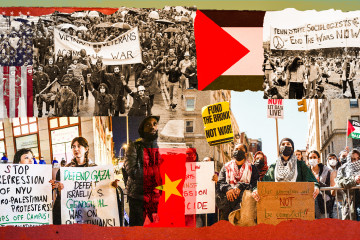
Europa: An Iraqi odyssey across the Turkish-Bulgarian border

Without mincing words, Haider Rashid’s Europa is a shocking, much-needed viewing experience. This fast-paced 72-minute fiction feature, presented in the Directors’ Fortnight section of this year’s Cannes Film Festival (6-17 July 2021), is a highly immersive journey revolving around the turbulent escape of a young Iraqi migrant along the Balkan route, and in particular across the Turkish-Bulgarian border.
Since its first images, Rashid’s film is frenetic and leaves the viewers breathless. It’s night time and a ruthless people trafficker (played by Mohamed Zouaoui) offers a group of migrants help to cross the border and enter “Fortress Europe” in return of a huge sum of money.
That encounter, however, might be a trap. In the blink of an eye, a handful of Turkish border patrol agents shows up. The officers hold ferocious dogs on the leash and starts attacking the immigrants to arrest them. A twenty-something man called Kamal (portrayed by talented British-Libyan Adam Ali), manages to run away amidst the chaos arisen during the assault.
"Crafted with no frills and boasting a high level of realism, Europa is a visceral parable about a man’s horrific journey who symbolises the struggles of many"
On the Bulgarian side of the border, however, many more perils await Kamal. Besides the natural obstacles posed by the immense old-growth forest and the obvious feeling of disorientation, Kamal is forced to deal with the presence of cruel organised groups of armed, local nationalists who call themselves “migrant hunters”. These violent vigilantes are ready to kill whoever enters Bulgaria for the sake of protecting the borders from “foreign invaders.”
In Europa, Kamal’s struggle for survival is depicted through a number of masterly crafted crane and hand-held shots. The camera is almost glued to the protagonist’s shoulders, and this claustrophobic cinematography allows Director of Photography Jacopo Maria Caramella not to miss a single gesture, movement or hesitant look.
Through a number of events and microevents taking place one after another, the tension becomes palpable. To some extent, the film’s tempo resembles that of a thriller flick, although the odyssey depicted in Rashid’s feature is based on real events.
Speaking to The New Arab, the Fiesole-born director Haider Rashid revealed that he started developing the feature in 2017. At the time, he was reading different testimonies of migrants crossing the Turkish-Bulgarian border and their terrifying escapes from local “hunters”.
One year before, he also directed No Borders, a VR documentary focusing on self-run reception centres for migrants in Rome and Ventimiglia, the first of its kind produced in Italy. “I wanted to exploit what I had learnt while working with VR and bring it onto the big screen. The idea was to offer a more linear experience, but still very immersive. We wanted to stick with the character, almost breathing with him".
"With Caramella we focused on shooting long takes – some lasting even seven, eight minutes – and keeping Kamal’s point of view as the primary focus. You can imagine how challenging it has been filming in such a wild forest, using a camera weighting at least 15 kilos,” Rashid explained.
Shot on a tight schedule over the course of three weeks, Rashid revealed how the story evolved on set: “The script was quite defined, but it also allowed us – at least in part – to ‘improvise’ and to find a compromise between practicality and creativity. [..] The more we stayed in the woods, the more we felt immersed in Kamal’s story, while being isolated from the outer world.”
Once out of the forest, Kamal ends up facing another threat, posed by two local inhabitants. These are a fearful middle-aged woman (veteran Bulgarian actress Svetlana Yancheva) and a giant old man living in a countryside house (Italy’s Pietro Ciciriello). Except for a few words pronounced by Yancheva and Ali, Rashid stages a picture where close-ups and extreme close-ups are at the core of the actors’ performances.
Yancheva’s shaking hands on the steering wheel while sitting next to the young stranger suddenly hopped on her car, Ciciriello’s silent brutality after spotting the “intruder” and Ali’s efforts to fight against his grip are only some of the details making Rashid’s direction accurate and convincing.
Commendably, the film sheds light on the atrocities committed by these death squadrons, a topic still reluctantly (and very rarely) covered by European media: “This phenomenon is still ongoing. It’s a business in which migrant hunters say they do it because they’re against foreign immigration, but in reality they earn money by stealing these people’s shoes, money, mobiles... There’s an underworld made of collusion involving the border patrol and the institutions... And this happens across other frontiers as well. Even at the border between Italy and France, one can find similar squadrons of Neo-Nazi and Neo-Fascists,” said the director.
An enthralling didactic experience, Rashid’s work should be screened in schools to teach future generations what migrants are experiencing in these troubled times. Crafted with no frills and boasting a high level of realism, Europa is a visceral parable about a man’s horrific journey who symbolises the struggles of many. We need more of these films, now more than ever.
Davide Abbatescianni is an Italian Film Critic and Journalist based in Cork, Ireland.
Follow him on Twitter: @dabbatescianni



